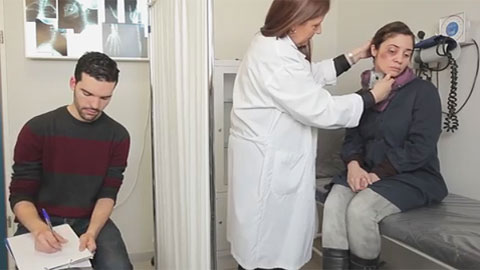Qualified interpreters demanded for cases of foreign domestic violence victims

27/05/2015
UAB researcher Marta Arumí and UVIc-UCC researcher Xus Ugarte, as well as Mireia Vargas-Urpí demanded provide legal guarantees for domestic violence (DV) victims from other countries who do not speak any of the languages spoken in Spain. These guarantees would include access to professional and specialised interpreters in all phases of assistance, not only in judicial and police processes.
This need has been clearly exposed in the project "Speak Out for Support" (SOS-VICS), which the researchers present in Catalonia as part of the Sixth Edition of Translation and Interpreting in Public Services, which will take place tomorrow 29 May at the UAB, organised by the group MIRAS (Mediació i Interpretació: Recerca en l’Àmbit Social).
Conducted by nine universities in Spain - including Catalan universities UAB and UVic-UCC - under the coordination of the Universidad de Vigo and cofinanced by the European Union's Criminal Justice Programme, SOS-VICS was conducted as a pilot project in the creation of training resources for interpreters specialising in attention to DM victims from countries outside of Europe.
Survey with 600 professionals
To gain in-depth knowledge of the needs in this matter, the project included and extensive and exhaustive study with approximately 600 professionals working in the judiciary, police, legal, social work, medical, psychological and translation and interpreting sectors, as well as victims of domestic violence, through questionnaires, workshops and in-depth interviews.
Of great importance were the 586 questionnaires handed out to public service agents assisting victims of domestic violence on their communication needs when handling victims who did not speak Catalan or Spanish and who, according to researchers, identified several problems in the quality of the interpreters' services. Among the data obtained, researchers highlight that 73% used the services of an interpreter at least once. However, one third of these declared that there was no established protocol in these cases. In 36% of the cases, communication is done through a person the victim knows.
Although the study took into consideration data from all over Spain, in the case of Catalonia, researchers were able to verify that the situation is a bit more positive, since it is the region in which - after the Basque Country - the highest number of interpreters are used (85%) and the region in which there is a higher number of protocols established for the use of these professionals (80%). (See more results below).
In addition, the in-depth interviews with DM victims from Morocco, Brazil, Guinea, Russia, Nigeria, Romania and Ethiopia also served to detect relevant deficiencies. Mireia Vargas-Urpí, researcher at the UAB at the time of the project and now researcher at the UPF, explains that the project “has shed light on cases in which the victims were put under pressure by non-professional interpreters, went to court without being able to communicate with their lawyer and in which no interpreter was offered to them during any stage of the judicial process. In other cases, women affirmed having signed documents without knowing what they were signing or what the implications were”.
Interviews with those assisting foreign DV victims revealed flaws in the system when hiring interpreters for these types of services, as well as the need for training more interpreters.
Finally, a survey handed out to experienced interpreters showed the lack of specialised training in the field and difficulties in finding training courses as evident obstacles in improving their interpreting skills.
“If we look at these results, it is obviously necessary for DV victims to have access to interpreters trained specifically in the court system and in domestic violence, as are the other professionals dealing with these people. The current situation is highly different, interpreters are hired through macro-interpreting companies and that often leads to the hiring of unqualified personnel. That is why it is a priority to professionalise the interpreters who work in these judicial and police processes”, demands Marta Arumí, coordinator of the project in Catalonia.
The researchers also find it crucial to apply Directive 2010/64/EU on the right to interpretation and translation in criminal proceedings and Directive 2012/29/EU establishing minimum standards on the rights, support and protection of victims of crime. These directives guarantee, by law, quality in the interpreting offered during judicial proceedings and consider it a guarantee to the right to a fair trial.
Training resources for interpreters and agents
“The data obtained has allowed us to offer solutions to the problems we have detected, in the form of training resources and good practice documents for all those offering assistance to victims of domestic violence from other countries”, explains Xus Ugarte, researcher at UVic-UCC.
In this sense, the research presented the guide on “Interpretation in Contexts of Domestic Violence” and a website with complementary resources and practical exercises for interpreters working in these fields; a “Good Practice Guide when Working with Interpreters ” addressed to professionals giving assistance to victims of DV, in which the role of interpreters is defined and doubts about intercultural communication and ethical code are discussed; and several materials in Spanish, English, French, Chinese, Romanian and Arabic for foreign victims, such as a video offering ways to identify violence and information and support resources.
In the future, the SOS-VICS project considers creating new resources so that professionals giving assistance to DV victims can detect the need to work with interpreters when they encounter victims who do not speak or understand the language.
The SOS-VIC project was coordinated by the Universidad de Vigo and included the participation of the following universities: Universitat Autònoma de Barcelona, Vic-Universitat Central de Catalunya, La Laguna, Alcalá, Jaume I, Granada, Alacant and Salamanca.
SOS-VICS project website
Project results